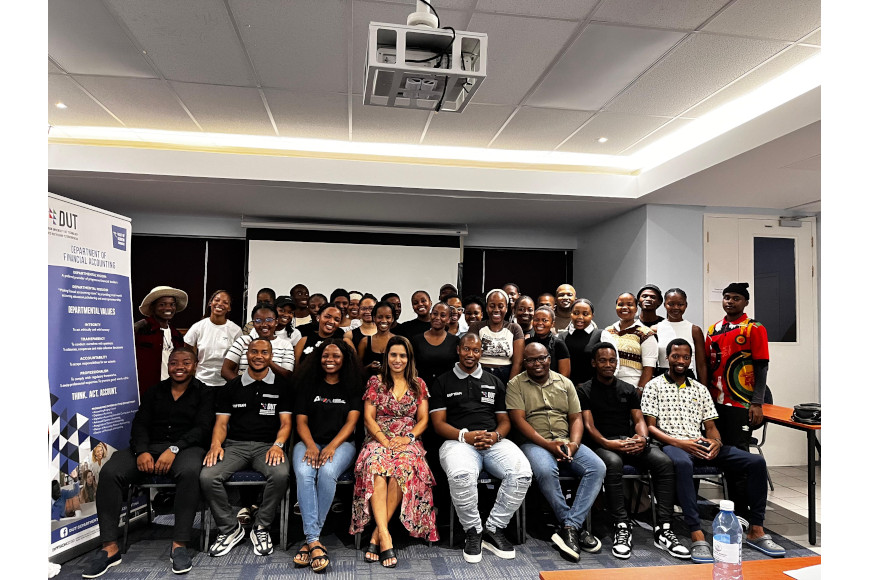The Extended Curriculum Programme (ECP) in the Department of Financial Accounting recently hosted a debate titled “Accounting Minds in Action: Critical Thinking for a Changing World of Work.” The platform was designed not only to sharpen students’ academic skills but also to demonstrate how accounting knowledge, analytical reasoning, and effective communication intersect in professional practice.
Central to the debate were pressing issues such as ethical dilemmas in accounting, breaches of standards, fraud, sustainability, and governance. One of the key questions posed was: Are technology and AI more reliable than human judgment in detecting accounting fraud?
The event was coordinated by Ms. Nolwando Mgilane, Financial Accounting lecturer and ECP Programme Coordinator, with the support of fellow lecturers Mr. Siphesihle Zungu, Mr. Ncazelo Mncwabe, Mr. Msawenkosi Jwara, and departmental secretary Mr. Mndeni Mthembu. Together, they created a space where students could engage with real-world accounting and business issues while building confidence in presenting their ideas persuasively.
The programme opened with a warm welcome from Mr. Siphesihle Zungu, who outlined the purpose of the day and extended gratitude to the Head of Department for her unwavering support of the ECP team.
Mr. Sthembiso Brian Jiyane, a Teaching and Learning Development Practitioner in the Faculty of Accounting and Informatics under the Centre for Excellence in Learning and Teaching (CELT), introduced the debate rules and guidelines. His facilitation reflected both his expertise in academic engagement and his ability to guide events with professionalism, ensuring the smooth flow of the programme.
The third-year ECP students were in motion, while the fourth years took the opposing side. From the outset, the third years demonstrated strong preparation and presented compelling arguments. Among their key points was the role of blockchain and cryptocurrencies in transforming financial systems. They also argued that artificial intelligence (AI) is not here to replace jobs but to strengthen accounting processes, accelerate efficiency, and enhance accuracy.
Additionally, the third years linked classroom learning to real-world application by drawing on the qualitative characteristics of financial information. They highlighted how principles such as relevance, reliability, comparability, and understandability align with the advantages of using AI in accounting. This was particularly impressive, as it showcased their ability to connect theoretical concepts taught in class with practical solutions to real-world problems.
To reinforce their position, they referred to well-known financial scandals, using these cases as evidence of the need for innovation and technological support in fraud detection. All their arguments were grounded in research, reflecting both critical thinking and informed analysis.
Adding to the discussion, a fourth-year student reflected that while AI and advanced models like Large Language Models (LLMs) can detect patterns and save time, they should never be mistaken for a replacement of human judgment. Over-reliance on AI may create blind spots, as these systems depend on historical data and struggle to detect new or innovative fraud schemes. The student emphasized that AI should be regarded as a guiding tool to support accountants, not as a substitute, since ethical reasoning, professional skepticism, and accountability remain uniquely human strengths.
The debate challenged students to think like professionals, applying critical reasoning to accounting-related topics while defending their views with logic, evidence, and creativity. This approach demonstrated that the event was not only about communication but also about connecting theory to practice in ways that mirror workplace expectations. Students exceeded expectations, impressing their lecturers with confidence, clarity, and the ability to articulate complex ideas.
Professor Ferina Marimuthu, Head of the Department of Financial Accounting, expressed her delight at the students’ performance: “There is so much talent in this room! You are truly ready for the world of work. I am very impressed by the way you articulate yourselves, you are amazing. In my eyes, you are all winners. You have done so well and demonstrated excellent communication skills,” she said.
Prof Marimuthu also commended the ECP staff for designing such a brilliant, accounting-focused initiative and encouraged them to continue embedding such platforms in the curriculum to nurture workplace-ready graduates.
Reflecting on the experience, Ms. Tsakane. Mahlanga, a third-year student and debate participant, shared: “We really appreciate this wonderful opportunity you gave us. It was challenging, but we managed to pull through, and we truly wish that these kinds of conversations could continue.”
The Accounting Minds in Action debate proved to be more than an academic exercise, it was a simulation of professional practice, encouraging students to think critically, communicate effectively, and solve problems collaboratively. The event clearly demonstrated that with the right support and platforms, ECP students are equipped not only to succeed academically but also to thrive in the demanding world of accounting and business.
Pictured: Mbalenhle Mthimkhulu
Photographer: Mbalenhle Mthimkhulu
Nolwando Mgilane

